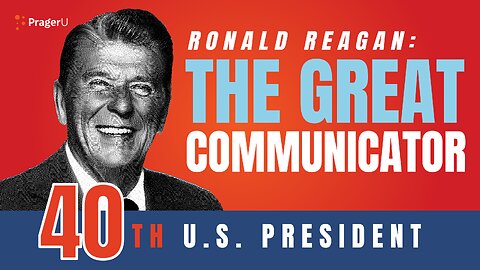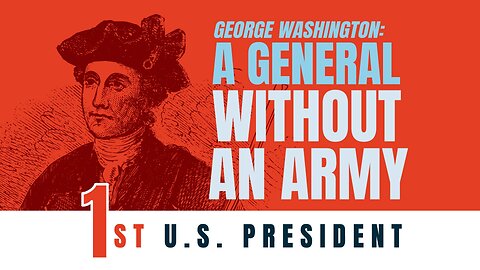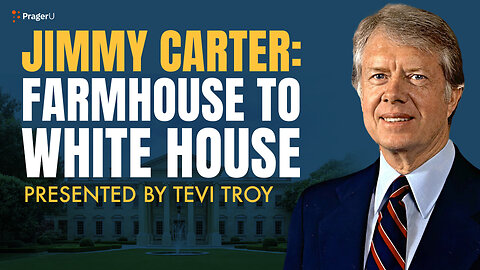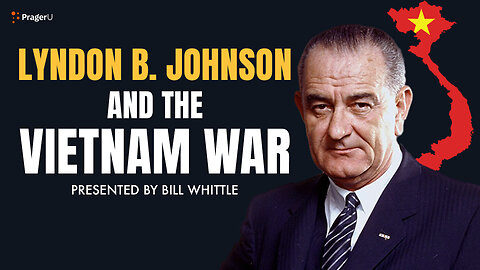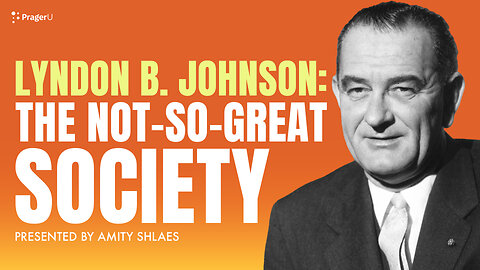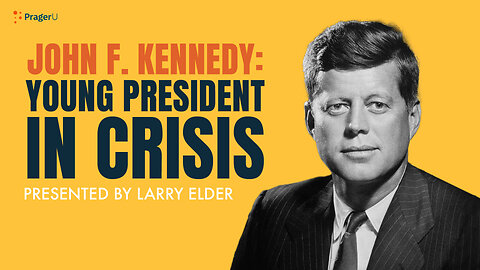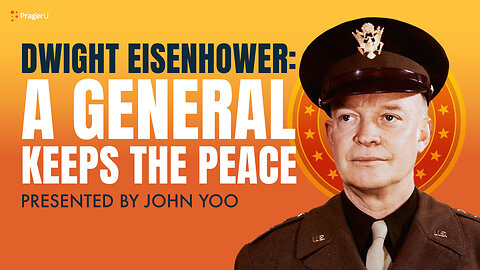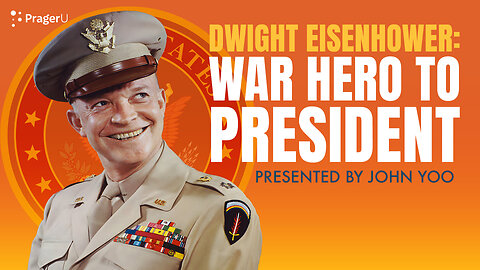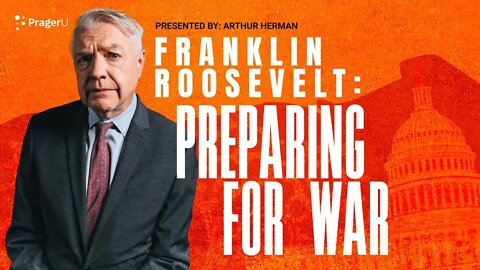-
Ronald Reagan: The Great Communicator | 5-Minute Videos | PragerU
 PragerUFew presidents have connected with the American people like Ronald Reagan did. Through a combination of persuasion and policy, our 40th president turned a depressed nation into a confident one. Scott Walker, former governor of Wisconsin and president of Young America's Foundation, explains how he did it. If you like this video, we have a whole series on the men who shaped America, check it out here:https://l.prageru.com/3PO4MzS Follow PragerU on social media! Instagram ➡️ (https://www.instagram.com/prageru/) X/Twitter ➡️ (https://twitter.com/prageru) Facebook ➡️ (https://www.facebook.com/prageru/) YouTube ➡️ (https://www.youtube.com/@PragerU) TikTok ➡️ (https://www.tiktok.com/@prageru)6.88K views 10 comments
PragerUFew presidents have connected with the American people like Ronald Reagan did. Through a combination of persuasion and policy, our 40th president turned a depressed nation into a confident one. Scott Walker, former governor of Wisconsin and president of Young America's Foundation, explains how he did it. If you like this video, we have a whole series on the men who shaped America, check it out here:https://l.prageru.com/3PO4MzS Follow PragerU on social media! Instagram ➡️ (https://www.instagram.com/prageru/) X/Twitter ➡️ (https://twitter.com/prageru) Facebook ➡️ (https://www.facebook.com/prageru/) YouTube ➡️ (https://www.youtube.com/@PragerU) TikTok ➡️ (https://www.tiktok.com/@prageru)6.88K views 10 comments -
George Washington: A General without an Army | 5-Minute Videos | PragerU
 PragerUIf George Washington helped to shape America, what shaped George Washington? Historian Edward Lengel explores Washington’s early history: the events that defined him and ultimately made him America’s “indispensable man.”9.55K views 3 comments
PragerUIf George Washington helped to shape America, what shaped George Washington? Historian Edward Lengel explores Washington’s early history: the events that defined him and ultimately made him America’s “indispensable man.”9.55K views 3 comments -
Jimmy Carter: Farmhouse to White House |5-Minute Videos | PragerU
 PragerUAfter the Watergate scandal, Jimmy Carter had the perfect campaign slogan: “I’ll never lie to you.” No one questioned his character; only his policies. He thought he could change the world. But the world ended up changing him. Historian Tevi Troy tells the story of the 39th President’s rise and fall.7.17K views 7 comments
PragerUAfter the Watergate scandal, Jimmy Carter had the perfect campaign slogan: “I’ll never lie to you.” No one questioned his character; only his policies. He thought he could change the world. But the world ended up changing him. Historian Tevi Troy tells the story of the 39th President’s rise and fall.7.17K views 7 comments -
Lyndon B. Johnson and the Vietnam War | 5-Minute Videos
 PragerULyndon B. Johnson wanted to wage a war on poverty. Instead, he waged a war halfway around the world in Vietnam. That conflict defined him, his presidency, and the decade of the 1960s. Historian Bill Whittle tells the story.5.67K views 7 comments
PragerULyndon B. Johnson wanted to wage a war on poverty. Instead, he waged a war halfway around the world in Vietnam. That conflict defined him, his presidency, and the decade of the 1960s. Historian Bill Whittle tells the story.5.67K views 7 comments -
Lyndon B. Johnson: The Not-So-Great Society | 5-Minute Videos
 PragerULyndon B. Johnson created hundreds of social programs to "cure" poverty. But who would administer those programs? And how exactly would they work? No one seemed to know. No one seemed to care. The goal was noble, and that’s all that mattered. Renowned historian Amity Shlaes explains. Get our content ad-free! Download the PragerU app! 👉https://prageru.onelink.me/3bas/rumble4.85K views 7 comments
PragerULyndon B. Johnson created hundreds of social programs to "cure" poverty. But who would administer those programs? And how exactly would they work? No one seemed to know. No one seemed to care. The goal was noble, and that’s all that mattered. Renowned historian Amity Shlaes explains. Get our content ad-free! Download the PragerU app! 👉https://prageru.onelink.me/3bas/rumble4.85K views 7 comments -
John F. Kennedy: Young President in Crisis | 5 Minute Videos
 PragerUWith John F. Kennedy at the helm, everything seemed possible—economic prosperity, progress toward racial equality, and even putting a man on the moon. But it all came crashing down in an instant. Larry Elder details the incredible career and legacy of JFK. Script: Everything about John F. Kennedy, the 35th President of the United States, was appealing: his good looks, his glamorous wife Jackie, their picture book children, Caroline and John Jr. JFK personified how America wanted to see itself: youthful, forward-looking, confident. But Kennedy had his doubters. Did he have the maturity and experience to lead the most powerful nation on earth? Early on, it seemed the answer was no. Within three months of taking office, he botched his first major foreign policy test, a poorly planned attempt to overthrow the communist government in Cuba. The failure, now known as the Bay of Pigs fiasco, was an international embarrassment. His meeting in Vienna in June 1961 with Soviet leader Nikita Khrushchev didn’t help matters. Khrushchev pushed Kennedy around like a playground bully. These early failures might have broken a lesser man, but Kennedy, a World War II Navy combat veteran turned out to be made of very stern stuff. The next confrontation with the Communists would be different. That confrontation happened in October 1962. Khrushchev, thinking he could intimidate Kennedy again, ordered the secret installation of nuclear-armed missiles in Cuba, just 90 miles from the Florida coast. Kennedy ordered a blockade of the island, insisting that the missiles be immediately removed. What ensued was a high-stakes standoff—the Cuban Missile Crisis. Kennedy’s advisors estimated 80 million Americans would die if war broke out. The Soviets could expect even worse losses. The world held its breath. This time, it was the Soviet dictator who blinked. The missiles were removed. The world breathed a huge sigh of relief, and America could get on with its seemingly limitless future because there would actually be a future.7.9K views 3 comments
PragerUWith John F. Kennedy at the helm, everything seemed possible—economic prosperity, progress toward racial equality, and even putting a man on the moon. But it all came crashing down in an instant. Larry Elder details the incredible career and legacy of JFK. Script: Everything about John F. Kennedy, the 35th President of the United States, was appealing: his good looks, his glamorous wife Jackie, their picture book children, Caroline and John Jr. JFK personified how America wanted to see itself: youthful, forward-looking, confident. But Kennedy had his doubters. Did he have the maturity and experience to lead the most powerful nation on earth? Early on, it seemed the answer was no. Within three months of taking office, he botched his first major foreign policy test, a poorly planned attempt to overthrow the communist government in Cuba. The failure, now known as the Bay of Pigs fiasco, was an international embarrassment. His meeting in Vienna in June 1961 with Soviet leader Nikita Khrushchev didn’t help matters. Khrushchev pushed Kennedy around like a playground bully. These early failures might have broken a lesser man, but Kennedy, a World War II Navy combat veteran turned out to be made of very stern stuff. The next confrontation with the Communists would be different. That confrontation happened in October 1962. Khrushchev, thinking he could intimidate Kennedy again, ordered the secret installation of nuclear-armed missiles in Cuba, just 90 miles from the Florida coast. Kennedy ordered a blockade of the island, insisting that the missiles be immediately removed. What ensued was a high-stakes standoff—the Cuban Missile Crisis. Kennedy’s advisors estimated 80 million Americans would die if war broke out. The Soviets could expect even worse losses. The world held its breath. This time, it was the Soviet dictator who blinked. The missiles were removed. The world breathed a huge sigh of relief, and America could get on with its seemingly limitless future because there would actually be a future.7.9K views 3 comments -
John F. Kennedy: A Star Is Born | 5 Minute Videos
 PragerUWith his movie star looks and beautiful young family, John F. Kennedy was the picture-perfect president of the television era. But some critics said he was too young and inexperienced to be president in a dangerous Cold War world. Were they right? Larry Elder recounts the remarkable political ascent of JFK. Script: On the morning of November 22, 1963, the United States was at the peak of its power. It dominated the world in every respect—militarily, economically, and culturally. Nothing seemed out of America’s reach, even the moon. The man guiding the ship of state was movie-star handsome, youthful (only 46), and always seemed to know what to say and how to say it. That man was John F. Kennedy, the 35th president of the United States. JFK was born just outside of Boston on May 29, 1917, the second of nine children. His father, Joe Kennedy, made a fortune trading stocks, selling whiskey, and financing movies. A noted philanderer, his affair with actress Gloria Swanson was the stuff of Hollywood legend. He parlayed his financial success into political success, eventually serving as Franklin Roosevelt’s ambassador to Great Britain. Joe expected much from his sons, but most especially from his eldest son, Joe, Jr. When young Joe died in Europe during World War II, the burden of the father’s ambitions fell on his second son. But there was no certainty that John, known to his family and friends as “Jack,” would survive the war. Some months earlier, when his PT boat was rammed by a Japanese destroyer in the South Pacific, it was assumed that he and his entire crew had been killed. But through Kennedy’s heroic efforts, all but two were rescued. For his bravery, Jack was awarded the Purple Heart. Living up to his father’s expectations and using the connections of his maternal grandfather, John “Honey Fitz” Fitzgerald—a former mayor of Boston—Kennedy was elected as a Democrat to Congress in 1946. Kennedy was just 29. But he already had his eyes on a bigger prize. In 1952 he was elected to the U.S. Senate. One year later, he married the beautiful socialite, Jacqueline Bouvier. Their wedding was the major event of the 1953 social season. There were 700 guests at the ceremony and 1,200 at the reception. With his new wife and new Senate seat, Kennedy was making all the right moves. Bored by the endless committee meetings in Congress, he focused on increasing his national profile, traveling around the country, giving speeches, and appearing on talk shows to discuss current events. With his distinct Boston accent, he developed a dynamic speaking style which, coupled with his good looks and beautiful young family, made him picture-perfect for the new age of television. He positioned himself as a centrist on domestic policy and a staunch anticommunist on foreign policy. By 1960, he was ready to make his presidential move. While his critics argued that, at age 43, he was too young and inexperienced for the nation’s highest office, Kennedy argued that it was time for a new generation to take charge. With his shrewd and loyal brother Bobby running his campaign, Kennedy won the Democratic nomination. But the race against Richard Nixon, Dwight Eisenhower’s vice president, would prove to be much tougher.196 views
PragerUWith his movie star looks and beautiful young family, John F. Kennedy was the picture-perfect president of the television era. But some critics said he was too young and inexperienced to be president in a dangerous Cold War world. Were they right? Larry Elder recounts the remarkable political ascent of JFK. Script: On the morning of November 22, 1963, the United States was at the peak of its power. It dominated the world in every respect—militarily, economically, and culturally. Nothing seemed out of America’s reach, even the moon. The man guiding the ship of state was movie-star handsome, youthful (only 46), and always seemed to know what to say and how to say it. That man was John F. Kennedy, the 35th president of the United States. JFK was born just outside of Boston on May 29, 1917, the second of nine children. His father, Joe Kennedy, made a fortune trading stocks, selling whiskey, and financing movies. A noted philanderer, his affair with actress Gloria Swanson was the stuff of Hollywood legend. He parlayed his financial success into political success, eventually serving as Franklin Roosevelt’s ambassador to Great Britain. Joe expected much from his sons, but most especially from his eldest son, Joe, Jr. When young Joe died in Europe during World War II, the burden of the father’s ambitions fell on his second son. But there was no certainty that John, known to his family and friends as “Jack,” would survive the war. Some months earlier, when his PT boat was rammed by a Japanese destroyer in the South Pacific, it was assumed that he and his entire crew had been killed. But through Kennedy’s heroic efforts, all but two were rescued. For his bravery, Jack was awarded the Purple Heart. Living up to his father’s expectations and using the connections of his maternal grandfather, John “Honey Fitz” Fitzgerald—a former mayor of Boston—Kennedy was elected as a Democrat to Congress in 1946. Kennedy was just 29. But he already had his eyes on a bigger prize. In 1952 he was elected to the U.S. Senate. One year later, he married the beautiful socialite, Jacqueline Bouvier. Their wedding was the major event of the 1953 social season. There were 700 guests at the ceremony and 1,200 at the reception. With his new wife and new Senate seat, Kennedy was making all the right moves. Bored by the endless committee meetings in Congress, he focused on increasing his national profile, traveling around the country, giving speeches, and appearing on talk shows to discuss current events. With his distinct Boston accent, he developed a dynamic speaking style which, coupled with his good looks and beautiful young family, made him picture-perfect for the new age of television. He positioned himself as a centrist on domestic policy and a staunch anticommunist on foreign policy. By 1960, he was ready to make his presidential move. While his critics argued that, at age 43, he was too young and inexperienced for the nation’s highest office, Kennedy argued that it was time for a new generation to take charge. With his shrewd and loyal brother Bobby running his campaign, Kennedy won the Democratic nomination. But the race against Richard Nixon, Dwight Eisenhower’s vice president, would prove to be much tougher.196 views -
Dwight Eisenhower: A General Keeps the Peace | 5-Minute Videos | PragerU
 PragerUThe 1950s are widely regarded as a period of undisputed American greatness. The United States dominated the world in almost every respect, from science to culture, from John Wayne westerns to commercial aviation. What was Dwight Eisenhower’s role in this decade of prosperity? John Yoo, Professor of Law at the University of California, Berkeley, has the answer. Script: When Dwight Eisenhower, or “Ike,” as he was universally known, was elected the 34th president of the United States in 1952, the American people weren’t exactly sure who they had voted for. He ran as a Republican, but was he a conservative? A moderate? A liberal? Ultimately, it didn’t really matter. The decorated World War II general who had waged war now promised to wage peace. And the voters trusted he would keep that promise. Their trust was not misplaced. His first major act as president was to resolve the conflict in Korea that had begun in 1950 and cost America 36,000 lives. Here’s how he did it: he made it clear to the Chinese, North Korea’s patron, that if they didn’t agree to a cease-fire, he would not hesitate to use nuclear weapons. Soon after, an agreement was reached, drawing a line between North and South Korea at the 38th parallel. That agreement stands to this day. Would Eisenhower have actually followed through on his threat? We’ll never know, but that was the whole point. “After Ike made peace in Korea,” Eisenhower biographer Jean Smith wrote, “not a single American died in combat for the next eight years.” Throughout his time in office, he was urged to use American military power to resolve conflicts. And for eight years he resisted. In 1953, the French wanted him to come in on their side in Vietnam. In 1955, Chiang Kai-shek, the ruler of Taiwan, wanted America’s help to take on Communist China. In 1956, the Hungarians wanted him to back their revolt against Soviet rule Each supplicant made a good case for American intervention. Each time, Eisenhower refused to commit American troops. If he didn’t see a clear path to victory, the risk, in his mind, was greater than the reward. And even though he said he was prepared to use nuclear weapons, he greatly feared their destructive power. To that end, he sought a treaty with the Soviets to end the arms race. He proposed that the US would open up all its military facilities to Russian inspection—provided the Soviets did the same. But the Soviet leader Nikita Khrushchev declined. He dismissed the proposal as an American trick to spy on the Soviet Union. It wasn’t a trick. Eisenhower really meant it. If Khrushchev wouldn’t make a deal, Eisenhower would do what he had to do: make sure that America’s nuclear capacity far outstripped the Soviets. But while he recognized the Soviet threat, he didn’t blindly accept the advice of his military chiefs. As a career soldier, he knew that the armed services always assumed the worst about an adversary’s capabilities—the better to boost their budgets. But Eisenhower never took the bait. In fact, he trimmed portions of the military budget repeatedly during his tenure. He famously worried about what he coined the “military-industrial complex”. He brought the same pragmatism to the domestic front. His philosophy here was not much different than his foreign policy philosophy: if he could keep the country out of war—in this case, political war —everything else would take care of itself. See the rest: https://l.prageru.com/4cvqxhs Follow PragerU on social media! Instagram ➡️ (https://www.instagram.com/prageru/) Twitter ➡️ (https://twitter.com/prageru) Facebook ➡️ (https://www.facebook.com/prageru/)4.9K views
PragerUThe 1950s are widely regarded as a period of undisputed American greatness. The United States dominated the world in almost every respect, from science to culture, from John Wayne westerns to commercial aviation. What was Dwight Eisenhower’s role in this decade of prosperity? John Yoo, Professor of Law at the University of California, Berkeley, has the answer. Script: When Dwight Eisenhower, or “Ike,” as he was universally known, was elected the 34th president of the United States in 1952, the American people weren’t exactly sure who they had voted for. He ran as a Republican, but was he a conservative? A moderate? A liberal? Ultimately, it didn’t really matter. The decorated World War II general who had waged war now promised to wage peace. And the voters trusted he would keep that promise. Their trust was not misplaced. His first major act as president was to resolve the conflict in Korea that had begun in 1950 and cost America 36,000 lives. Here’s how he did it: he made it clear to the Chinese, North Korea’s patron, that if they didn’t agree to a cease-fire, he would not hesitate to use nuclear weapons. Soon after, an agreement was reached, drawing a line between North and South Korea at the 38th parallel. That agreement stands to this day. Would Eisenhower have actually followed through on his threat? We’ll never know, but that was the whole point. “After Ike made peace in Korea,” Eisenhower biographer Jean Smith wrote, “not a single American died in combat for the next eight years.” Throughout his time in office, he was urged to use American military power to resolve conflicts. And for eight years he resisted. In 1953, the French wanted him to come in on their side in Vietnam. In 1955, Chiang Kai-shek, the ruler of Taiwan, wanted America’s help to take on Communist China. In 1956, the Hungarians wanted him to back their revolt against Soviet rule Each supplicant made a good case for American intervention. Each time, Eisenhower refused to commit American troops. If he didn’t see a clear path to victory, the risk, in his mind, was greater than the reward. And even though he said he was prepared to use nuclear weapons, he greatly feared their destructive power. To that end, he sought a treaty with the Soviets to end the arms race. He proposed that the US would open up all its military facilities to Russian inspection—provided the Soviets did the same. But the Soviet leader Nikita Khrushchev declined. He dismissed the proposal as an American trick to spy on the Soviet Union. It wasn’t a trick. Eisenhower really meant it. If Khrushchev wouldn’t make a deal, Eisenhower would do what he had to do: make sure that America’s nuclear capacity far outstripped the Soviets. But while he recognized the Soviet threat, he didn’t blindly accept the advice of his military chiefs. As a career soldier, he knew that the armed services always assumed the worst about an adversary’s capabilities—the better to boost their budgets. But Eisenhower never took the bait. In fact, he trimmed portions of the military budget repeatedly during his tenure. He famously worried about what he coined the “military-industrial complex”. He brought the same pragmatism to the domestic front. His philosophy here was not much different than his foreign policy philosophy: if he could keep the country out of war—in this case, political war —everything else would take care of itself. See the rest: https://l.prageru.com/4cvqxhs Follow PragerU on social media! Instagram ➡️ (https://www.instagram.com/prageru/) Twitter ➡️ (https://twitter.com/prageru) Facebook ➡️ (https://www.facebook.com/prageru/)4.9K views -
Dwight Eisenhower: War Hero to President
 PragerUAs the Korean War intensified, war-weary Americans turned to a new leader, General Dwight D. Eisenhower, the hero of World War II, to bring them peace. “Ike,” as he was known to everyone, didn’t disappoint them. Script: The Allies defeated the Axis powers—Germany and Japan—in World War II in no small part because of America’s brilliant generals—men like George Marshall, George Patton, Douglas MacArthur, Omar Bradley, and Dwight Eisenhower. Of that illustrious group, only one—Eisenhower—reached America's highest office, serving as the 34th president of the United States. What made him stand out among his contemporaries? Dwight David Eisenhower was born on October 14, 1890. Young Dwight, or “Ike” as he came to be known to everyone, was the third of seven children—all boys. Of his childhood, the future president would later say, “We were very poor, but the glory of America is that we didn't know it...” Looking for a ticket out of his hometown of Abilene, Kansas, Ike entered the U.S. Military Academy at West Point in 1911. He did little to distinguish himself academically, focusing more on football than his studies. Upon graduating as a second lieutenant, he was posted to Fort Sam Houston in San Antonio, Texas. There, he met the petite, vivacious, and charming Mamie Doud. The daughter of a prosperous businessman, Mamie was used to cooks and servants but gave it all up for the spartan life of a military spouse when she married Ike in 1916. She would spend the next two decades moving from one dreary Army base to the next. But as long as she was with her husband, she was happy. “Ike was my career,” she said years later. When America entered World War I in 1917, Eisenhower, to his frustration, was ordered to remain stateside to train others for combat. It was a bitter blow, and it set the pattern of Eisenhower’s life for twenty years. As others rose to senior positions, his career stalled. He seemed destined to serve great men, not to be one. From 1935 to 1939, Eisenhower worked as Douglas MacArthur’s top aide in the Philippines, where they helped train the local army, giving the young man from Abilene his first real taste of international politics. MacArthur was an extremely difficult personality who almost drove Ike to his wit’s end. See the rest: https://l.prageru.com/3zdWVqn Follow PragerU on social media! Instagram ➡️ (https://www.instagram.com/prageru/) Twitter ➡️ (https://twitter.com/prageru) Facebook ➡️ (https://www.facebook.com/prageru/)5.88K views 3 comments
PragerUAs the Korean War intensified, war-weary Americans turned to a new leader, General Dwight D. Eisenhower, the hero of World War II, to bring them peace. “Ike,” as he was known to everyone, didn’t disappoint them. Script: The Allies defeated the Axis powers—Germany and Japan—in World War II in no small part because of America’s brilliant generals—men like George Marshall, George Patton, Douglas MacArthur, Omar Bradley, and Dwight Eisenhower. Of that illustrious group, only one—Eisenhower—reached America's highest office, serving as the 34th president of the United States. What made him stand out among his contemporaries? Dwight David Eisenhower was born on October 14, 1890. Young Dwight, or “Ike” as he came to be known to everyone, was the third of seven children—all boys. Of his childhood, the future president would later say, “We were very poor, but the glory of America is that we didn't know it...” Looking for a ticket out of his hometown of Abilene, Kansas, Ike entered the U.S. Military Academy at West Point in 1911. He did little to distinguish himself academically, focusing more on football than his studies. Upon graduating as a second lieutenant, he was posted to Fort Sam Houston in San Antonio, Texas. There, he met the petite, vivacious, and charming Mamie Doud. The daughter of a prosperous businessman, Mamie was used to cooks and servants but gave it all up for the spartan life of a military spouse when she married Ike in 1916. She would spend the next two decades moving from one dreary Army base to the next. But as long as she was with her husband, she was happy. “Ike was my career,” she said years later. When America entered World War I in 1917, Eisenhower, to his frustration, was ordered to remain stateside to train others for combat. It was a bitter blow, and it set the pattern of Eisenhower’s life for twenty years. As others rose to senior positions, his career stalled. He seemed destined to serve great men, not to be one. From 1935 to 1939, Eisenhower worked as Douglas MacArthur’s top aide in the Philippines, where they helped train the local army, giving the young man from Abilene his first real taste of international politics. MacArthur was an extremely difficult personality who almost drove Ike to his wit’s end. See the rest: https://l.prageru.com/3zdWVqn Follow PragerU on social media! Instagram ➡️ (https://www.instagram.com/prageru/) Twitter ➡️ (https://twitter.com/prageru) Facebook ➡️ (https://www.facebook.com/prageru/)5.88K views 3 comments -
Franklin Roosevelt: Preparing for War
 PragerUIn 1940, Nazi Germany overran France. Britain looked to be the next target. President Franklin Roosevelt knew he had to prepare America for war. But how? Arthur Herman, senior fellow at the Hudson Institute and author of Freedom's Forge, tells the amazing story. SUBSCRIBE 👉 https://www.prageru.com/join #fdr #roosevelt #ww2 Script: In May 1940 the Nazi Blitzkrieg was overrunning France. Great Britain would be next. British Prime Minister, Winston Churchill sent a telegram to the American President, Franklin Roosevelt. “I trust you realize,” Churchill wrote, “the voice and the force of the United States may count for nothing if they are withheld too long.” Roosevelt was a former Assistant Secretary of the Navy and a student of naval strategy. If Hitler were to take control of Britain, he would take control of the Atlantic. This, Roosevelt knew, would pose a grave threat to America. Roosevelt also knew America wasn’t ready for war—not psychologically (most Americans didn’t want to get involved in a conflict on the other side of the ocean) and not militarily. The United States had the world’s eighteenth largest army. Hungary and even Holland had bigger armies, while Hitler commanded the most advanced military machine ever seen. The Army’s Chief of Staff General George Marshall told Roosevelt that if Hitler overran Europe and landed seven divisions on the East Coast, there was nothing anyone could do to stop him. With all this staring Roosevelt in the face, it would have been irresponsible for the Commander in Chief not to arm the United States for war. But how? Many in his administration believed then, as many Americans believe now, that the only way to deal with an extreme crisis was to give the government as much power and authority as possible. But FDR had the insight to realize that a massive wartime buildup during what was still peacetime wouldn’t succeed unless he harnessed the productive power of American business; that is to say, American free market capitalism. The federal government could help coordinate industry’s efforts; it could make sure resources like steel and aluminum got to the places where they were most needed, but otherwise the government would have to back off. To the president who had created an alphabet soup of Federal agencies to dig the country out of the Great Depression, this was about as un-Roosevelt as you could get. But to his everlasting credit, the President realized that what he and the Democrats had tried with the Depression and failed—to manage the economy through government decree—wasn’t going to work when it came to preparing for war. The man Roosevelt called for help was General Motors CEO William Knudsen, a Danish-born immigrant who had worked his way up from the Brooklyn shipyards to head the largest automobile company in the world. Knudsen told the president that if he gave him 18 months, America would have more planes, tanks, and warships than it would know what to do with. Roosevelt gave Knudsen what he wanted. In one of his most famous radio speeches in December 1940, a year before Pearl Harbor, the President told the American people that “we must be the great arsenal of democracy.” He backed up his words with action. For the full script, visit: https://www.prageru.com/video/franklin-roosevelt-preparing-for-war545 views 1 comment
PragerUIn 1940, Nazi Germany overran France. Britain looked to be the next target. President Franklin Roosevelt knew he had to prepare America for war. But how? Arthur Herman, senior fellow at the Hudson Institute and author of Freedom's Forge, tells the amazing story. SUBSCRIBE 👉 https://www.prageru.com/join #fdr #roosevelt #ww2 Script: In May 1940 the Nazi Blitzkrieg was overrunning France. Great Britain would be next. British Prime Minister, Winston Churchill sent a telegram to the American President, Franklin Roosevelt. “I trust you realize,” Churchill wrote, “the voice and the force of the United States may count for nothing if they are withheld too long.” Roosevelt was a former Assistant Secretary of the Navy and a student of naval strategy. If Hitler were to take control of Britain, he would take control of the Atlantic. This, Roosevelt knew, would pose a grave threat to America. Roosevelt also knew America wasn’t ready for war—not psychologically (most Americans didn’t want to get involved in a conflict on the other side of the ocean) and not militarily. The United States had the world’s eighteenth largest army. Hungary and even Holland had bigger armies, while Hitler commanded the most advanced military machine ever seen. The Army’s Chief of Staff General George Marshall told Roosevelt that if Hitler overran Europe and landed seven divisions on the East Coast, there was nothing anyone could do to stop him. With all this staring Roosevelt in the face, it would have been irresponsible for the Commander in Chief not to arm the United States for war. But how? Many in his administration believed then, as many Americans believe now, that the only way to deal with an extreme crisis was to give the government as much power and authority as possible. But FDR had the insight to realize that a massive wartime buildup during what was still peacetime wouldn’t succeed unless he harnessed the productive power of American business; that is to say, American free market capitalism. The federal government could help coordinate industry’s efforts; it could make sure resources like steel and aluminum got to the places where they were most needed, but otherwise the government would have to back off. To the president who had created an alphabet soup of Federal agencies to dig the country out of the Great Depression, this was about as un-Roosevelt as you could get. But to his everlasting credit, the President realized that what he and the Democrats had tried with the Depression and failed—to manage the economy through government decree—wasn’t going to work when it came to preparing for war. The man Roosevelt called for help was General Motors CEO William Knudsen, a Danish-born immigrant who had worked his way up from the Brooklyn shipyards to head the largest automobile company in the world. Knudsen told the president that if he gave him 18 months, America would have more planes, tanks, and warships than it would know what to do with. Roosevelt gave Knudsen what he wanted. In one of his most famous radio speeches in December 1940, a year before Pearl Harbor, the President told the American people that “we must be the great arsenal of democracy.” He backed up his words with action. For the full script, visit: https://www.prageru.com/video/franklin-roosevelt-preparing-for-war545 views 1 comment
